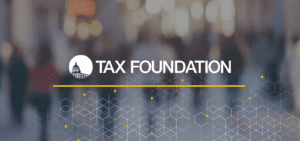The economic crisis caused by the coronavirus pandemic poses a triple challenge for tax policy in the United States. Lawmakers are tasked with crafting a policy response that will accelerate the economic recovery, reduce the mounting deficit, and protect the most vulnerable.
To assist lawmakers in navigating the challenge, and to help the American public understand the tax changes being proposed, the Tax Foundation’s Center for Federal Tax Policy modeled how 70 potential changes to the tax code would affect the U.S. economy, distribution of the tax burden, and federal revenue.
In tax policy there is an ever-present trade-off among how much revenue a tax will raise, who bears the burden of a tax, and what impact a tax will have on economic growth. Armed with the information in our new book, Options for Reforming America’s Tax Code 2.0, policymakers can debate the relative merits and trade-offs of each option to improve the tax code in a post-pandemic world.

In Her Tax Era—The Tax Impact of Taylor Swift’s Eras Tour
Taylor Swift’s Eras Tour highlights that taxes impact everyone, artists and fans alike.
3 min read
Taxes and Illicit Trade
Taxation plays a key role in driving illicit trade. People respond to incentives, and sizable price markups for legal cigarettes create incentives for tax avoidance.
4 min read
Inconsistent Tax Treatment of Student Loan Debt Forgiveness Creates Confusion
Starting on September 1st, federal student loan payments will resume after a three-and-a-half-year pause on payments and accrued interest following the onset of the COVID-19 pandemic.
6 min read
Montana Enacts Strong Reforms—Now, It’s Time for Sound Property Tax Relief
Montana Policymakers should pursue principled property tax reform that benefits all property owners without creating market distortions or unfairly shifting the tax burden.
5 min read
Introducing TaxFoundation.org 2.0
Our newly enhanced website will improve accessibility to the very data, research, and experts that make us the world’s leading independent tax policy organization.
3 min read
Germany’s Tax Proposals: Enhancing Loss Treatment but Dropping the Super-Deduction
For policymakers in Germany, corporate taxation stands out as a promising area for reform. See Germany tax reform and Germany tax proposals.
5 min read
What You Need to Know about the Global Tax Deal
The technical rules that were once solely the province of tax wonks in D.C. and Paris are being brought out into the public sphere.
5 min read
Let Mattel You about Barbie’s Taxes
In Greta Gerwig’s new Barbie movie, Barbie’s venture outside of Barbieland introduces her to new experiences. But what about Barbie and taxes?
3 min read
Weeding the Garden of International Tax
Simplifying international tax rules will not solve all the challenges that stand in the way of healthy cross-border investment, but eliminating unnecessary provisions would be a positive pivot relative to the trajectory of recent years. It’s high time that policymakers stopped pursuing ever more complex rules and started the hard work of simplification.
6 min read
“Monetizing” Clean Energy Tax Credits Creates a Sham Market for Bad Policy
Explore IRS clean energy tax credits, including Direct Pay, the IRA and CHIPS Act tax provisions, and Section 1603 grant program. See more.
7 min read